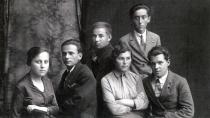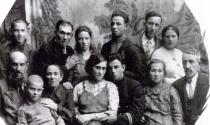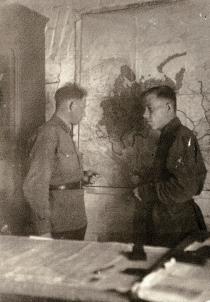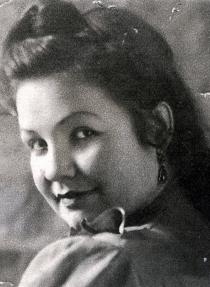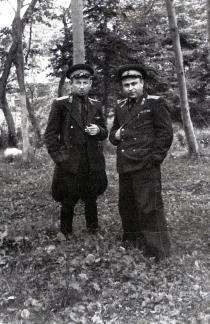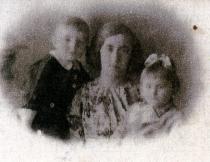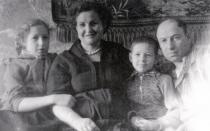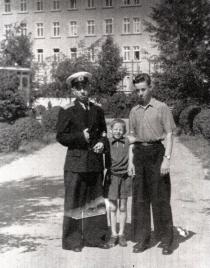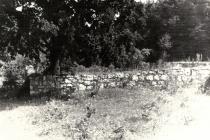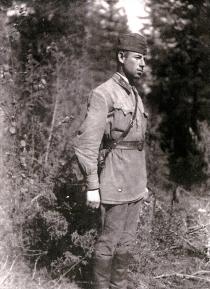
Grigoriy Sirotta
Lvov
Ukraine
Interviewer: Ella Orlikova
Date of interview: July 2002
The families of my father and mother lived in the Pale of Settlement 1, not far from the town of Nova-Ushytsya. Regretfully, I don't remember my grandmothers or grandfathers. They died before I was born. I know that my grandfather on my father's side, Moisey Sirotta, was a pretty poor craftsman. He was very religious, observed all Jewish traditions and always wore a kippah a small cap. My father told me that my grandfather was a very hardworking man. He was a great hat maker. He only spoke Yiddish and communicated with other Jews of his circle. My father remembered that the house was full of hat stands with a large number of hats on them. My grandfather didn't know his parents, that's why our family name was Sirotta [Russian for 'orphan']. My grandfather died in 1909 at the age of 63.
Nobody in my family ever talked about my grandfather's wife. She died a long time ago, at the end of the 19th century. I have no idea what her name was and what she did. My grandfather and grandmother had five or six children. Apart from my father, David Sirotta, I only knew one of them, Moishe Sirotta, who was born in 1872. He became a wine-grower. I saw him once in my life. We visited him in Dunayevtsy when I was 3 years old. I was immensely impressed by the barrels of wine in his cellar. I know that he died of some disease in the 1920s. He didn't have a family of his own.
My father was born in Shcherbakovtsy village near Nova-Ushytsya in 1874. He went to cheder every morning like all other Jewish boys. He was just a little boy, and an assistant from cheder often had to carry him there from his home, especially in winter because my father and his brother Moishe only had one pair of shoes, which they had to share. There were children of 4 to 13 years at cheder. They were all doing their tasks in one classroom, reading or reciting, and it was very noisy. The rabbi, who was also the teacher at cheder, slapped naughty boys on their hands. My father was an industrious pupil.
I don't know much about my mother's parents. My mother's father, Yankel Frishman, was born in 1855. He was a small merchant in Nova-Ushytsya. He sold haberdashery. Once he even owned a fish store but he went bankrupt. He was a very respectable man in Nova-Ushytsya. He went to the synagogue every Saturday and invited poor Jews to his house on holidays. He always tried to help them and treat them to a meal. My grandfather prayed a lot at the synagogue and at home. He generally spoke Yiddish, but he spoke Ukrainian to his Ukrainian customers. He died in 1912.
My grandmother, Riva Frishman, born in 1857, was a wonderful housewife. She always kept the house very clean. She always baked challah and made stuffed fish on Saturday. She was educated at home, but she loved Yiddish books and taught my mother to read. I know that she was a religious woman. She celebrated Sabbath. She was a very nice and kind woman. She died of spotted fever in the fall of 1914, at the beginning of World War I. I don't know how many children my grandmother had, apart from my mother.
My mother, Sarrah Sirotta [nee Frishman], was born in 1879. She was a very smart girl and, although she was only educated at home, she liked to read in Yiddish and always dreamed of seeing the world. She found the routinely life of a Jewish neighborhood a burden, but she was an obedient daughter and helped her mother with the house chores and her father in the store, when necessary. She found it a pleasant chore to light candles on Friday night.
My mother met my father in 1900. They were introduced to one another by a shadkhan, which was customary at that time. They got married the same year. They had a traditional Jewish wedding with a chuppah and klezmer musicians. After the wedding my parents moved to Shcherbakovtsy village. I remember that I had some 'aunts' in Nova-Ushytsya, but I don't know whether they were my mother's sisters or cousins. I don't remember any close relatives of my mother's.
My father worked as a miller for the landlord in the beginning, and later he rented the mill in Shcherbakovtsy. He was a very hardworking man. He went to work when we were still asleep and came back home when we were already going to bed. The mill mainly provided services to Ukrainian farmers. They treated my father nicely and with respect. Nobody ever abused him at work for his nationality. We were the only Jewish family in this village. My parents rented a house near the mill. My sister, my two brothers and I were all born in Shcherbakovtsy. Etl was born in 1902. She finished the Russian grammar school for girls in Nova-Ushytsya before the Revolution of 1917 2. She didn't tell me anything about her studies. She was very beautiful. My older brother, Misha, was born in 1909. He was a very active and lively boy. He went to cheder in the neighboring Jewish village. My mother took the boys there every morning. One couldn't call Misha an industrious pupil. The rabbi complained to our mother about Misha's behavior, which left much to be desired. Misha always helped my father at the mill. My second brother, Yasha, born in 1913, was a very industrious and exemplary pupil.
I was born in 1916 and the youngest in the family. I have almost no memories of our life in Shcherbakovtsy because we left in 1920. During the Civil War 3 there were many gangs 4 in our neighborhood.1. They robbed houses and killed people, especially Jews. The local Ukrainians were hiding us. I remember that we were hiding, but I didn't understand why back then. we were hiding at that time. Later my father told me that Petliura 5 soldiers broke into our house, pointed the gun at his face and said, 'Give us the gold and money'. But we didn't have money or gold, except for my parent's rings and my mother's earrings. They took those away and knocked out my father's teeth. It became scary to live there any longer, and we had to move out.
We moved to Zemikhovo, two kilometers from Shcherbakovtsy. There are many villages in that area, but Zemikhovo was a big one, and it soon became a town. Its population consisted of Ukrainians, Jews, Poles, Russians and even two gypsy families. There was no hostility among the inhabitants. People celebrated religious and Soviet holidays quietly and calmly with a benevolent attitude towards the representatives of the various nations. However, there were drunk people on holidays, and they had fights, but I believe it was more because there was no other entertainment than anything else. They tried to make amends for it and apologize the next day, and the peace lasted until the next holidays when everything repeated itself.
The Jews lived in the center of the village. There were about 50 Jewish families. They earned their living with crafts. There was a synagogue in the center, an Orthodox Christian church and a Catholic cathedral. All these religious edifices were kept in absolute order and very clean.> People of all nationalities treated them with care and respect.
My parents were very religious. They only spoke Yiddish, although my mother knew Ukrainian well, and a little Russian and Polish. My father also knew Ukrainian because he had to communicate with Ukrainian farmers. We strictly observed all Jewish traditions. The only thing where my mother took liberties was that she didn't wear a shawl. She had thick and very beautiful hair. My father always wore a cap in the summer and a hat in the winter. On Fridays my mother changed her clothes and lit two candles in silver candlesticks. Of course she covered her head during the prayers. She said a prayer quietly and sort of embraced the flames of the candles with her hands. My father usually returned late from work, but on Fridays he came back earlier to go to the synagogue. After he returned my mother served our dinner. My father said a prayer, praising the Lord, blessing the Holy Saturday and the food, and afterwards we all had dinner. My mother cooked food for Saturday and put it in the oven to keep it warm. On Saturday my parents rested or went to see relatives and friends. We, children, played in the yard.
On Pesach my mother cooked kneydlakh, little balls from matzah flour. They were very delicious. I've tried to make them but I failed. We began to make matzah a month before Pesach. My father brought a few bags of flour, and my mother baked matzah in the oven. I loved to help her. Freshly made matzah is ever so delicious. We had no bread at home throughout the 8 days of Pesach. My mother also bought red wine for Pesach. The whole family got together for seder on the first night of Pesach. My father read the Haggadah. I remember my older brother asking my father the traditional question [the mah nishtanah] in Hebrew four times, 'Why is this night different from all other nights?'. My father replied with quotations. I also went to the synagogue when I was a boy.
When I was 13 I went to the synagogue with my father to have my bar mitzvah. (coming of age of a Jewish boy).I can't remember well what was going on. It wasn't such a big event for me. It was more like a tribute to the ancient tradition, which was necessary to observe. I had to say the prayers that I had learned by heart. I had a teacher teaching me religion and traditions, and my brother and my father often read the Torah to me.
The mill that my father leased gave some profit, and we bought a house in Zemikhovo. It was a very nice house, and I can still picture it in my dreams. There were three rooms and a kitchen in the house. There was a dinner table, a carved cupboard, a sofa, silver candlesticks, bent-back chairs, which were called 'Viennese', and a big rubber plant next to the wall. The house had wooden floors and a tiled roof. We had a Russian stove 6 and kerosene lamps. In the other room there were two beds, my father's and mother's, and a big box. We had a small kitchen garden, in which my mother grew vegetables: onions, radish, parsley, dill. We had one, sometimes two, cows as well as chickens and geese. So we always had meat, eggs, sour cream, butter and milk. All this was kosher food. We never mixed dairy and meat products, and my mother always went to the shochet to have the poultry slaughtered.
Most of the Jewish houses were poor and required repairs. They had clay floors that were covered with a special mixture of clay, hay and manure. Each Jewish house had a store or a workshop inside it, such as a sewing workshop, a tinsmith's shop or a bakery.
The brightest memory of my childhood is my sister Etl's wedding. She got married in 1922. Her fiancé's name was Pynia. He worked as a tobacco cutter at the tobacco factory in the town of Kahles [28 kilometers from Zemikhovo]. This factory still exists. It manufactures the Podoliye cigarettes. The wedding took place in our house in Zemikhovo. It was a traditional Jewish wedding. There were tables in our big room with wine, cherry liqueur and vodka on them. There were strudels with sugar, honey and nuts. It was the food of the Gods! Of course, there was also stuffed fish. There was a klezmer brass orchestra from Nova-Ushytsya and people danced. I remember the sher, a beautiful Jewish dance. «I don't remember all the dances, but I remember a waltz that my brother Yasha and I danced together. He wanted to lead and so did I. In this regard we hit each other on the face. There were guests of honor, the rabbi and the shochet shoihet (he slaughtered poultry and made it kosher meat in accordance with the Jewish rules). The bride and bridegroom were married next to the synagogue. There were four posts and a beautiful cover on them [a chuppah]. The rabbi read a prayer. The procession went there with music, and the music was also playing on their way back. Many people came to watch.
After the wedding my sister moved to Pynia's parents' in Kahles. She gave birth to two boys: Yasha in 1924 and Misha in 1928. Yasha was a very musical boy. He played string instruments wonderfully. He could have become a great musician, I'm sure. As for the second boy, he liked reading and making things. Yasha and Misha treated both old and young people with great respect. They were handsome and good-mannered boys. Etl, her husband and their sons were killed in the ghetto in Nova-Ushytsya.
Our family was enthusiastic when the Soviets came to power in 1917. The new regime seemed to bring a fair and educated life to the people. We believed that there would be no oppression of the Jews, that people would be equal and that problems we faced were temporary. My mother liked to read the newspapers Der Emes [Truth] and Der Shtern [Star]. They were Soviet communist newspapers published in Yiddish. My mother also read many classic books in Yiddish. She was very proud that she was the same age as Stalin. My father read much less, but he also respected the Soviet Union, although, as a kulak 7, he was deprived of the right to vote and actually repressed.
Our house was sold at an auction because of we couldn't pay the high tax, which was levied on us by a visiting financial official. We didn't have the money to pay for it. This happened in the early 1930s when the process of the dispossession of the kulaks began. We moved into a one-bedroom facility with a kitchen. The conditions there were terrible. Two or three years later, when the parents of my sister's husband died, we moved into their apartment. It was a two-bedroom apartment with a kitchen. There was a clay floor in one room, and a plank floor in the other room. The kitchen was between the two rooms.
The authorities expropriated my father's mill [at the end of the 1920s] and he became a stableman. There were two collective farms 8: a Ukrainian and a Jewish one. The chairman of the Jewish farm was named Sholom. He was a very industrious and honest man. We went to the collective farm hoping to get something there. The horses in the stables were starving. My father guarded them at night. One night I had to replace him, as he had to go to the village. It was a terrible night. The stables were located between the Ukrainian and the Jewish cemetery. I couldn't help thinking of anything but the dead in white clothes. I was terrified whenever I heard a sound. I was 13 at the time, and I was alone. I wouldn't have done anything if somebody had come with evil intentions. But there were other times when boys from the Ukrainian collective farm and I took horses to the pasture at night. That was wonderful. What beautiful nights they were!
My friends were Jewish, Ukrainian, Russian and Polish boys. We spoke Russian. We went swimming in a pond. We were friends. Sometimes we had fights but no nationality conflicts. We didn't differentiate between Jewish and non-Jewish friends. I went to the Jewish 4-year school in Zemikhovo. We studied in Yiddish, but we didn't study any special Jewish subjects. All schools in the USSR had to comply with the standard and mandatory program. We also had Russian and Ukrainian classes. I shared a desk with Liza, a beautiful girl. Later her family moved to Russia.
I was a pioneer like everybody else. Once there was a relay race with a baton in our school. I didn't have any idea what it was like to run with a baton, but I was a good runner. There were many people on the route, which went uphill. When a boy gave me the baton he injured my hand, and I ran without the baton. Then I had to return to pick up the baton. Because of this delay another boy outran me, but he pushed me and I fell and tore my pants. I felt hurt that I had lost, and hit that boy in the face so hard that his nose started bleeding. There was a tailor at the competition, and he wanted to mend my pants. I went to his home. I had never seen such poverty before. He had a plank table and a sewing machine. That was all. I felt so sorry for him. I wrote a little poem in Yiddish about the poverty and misery of this man. He was a small man. Since I was the editor of the school newspaper, I placed my poem where it would be seen best. The director of the school, Smotritskiy, a Jew, called me into his office, said that I was talented and asked me if I wanted to write poems. I said that I did. My poetic activities ended where they began though. I had to move to Nova-Ushytsya to continue my studies in the 5th grade because there was only a primary school in our village.
After 1917 the lives of many people in Zemikhovo became much worse, and they wanted to move somewhere else. It was at that time that my older brother, Misha, got into trouble. He was the secretary of the village council, which was an official position. He was the second most important man in the village, after the chairman of the village council, and he issued two certificates to his Ukrainian friends. They wanted to continue their studies in town. During this period people weren't allowed to move from villages to towns, and the village authorities weren't allowed to issue such certificates. Misha was taken to court for issuing these two certificates and sentenced to imprisonment in jail in Dnepropetrovsk. He worked at the Petrovskiy plant. I visited him once in 1934. I spent three days with him and that was the last time that I saw him. Later he went to work in Ulan-Ude, Kazakhstan, as my brother Yasha told me. Yasha also found out that Misha perished in 1943. I have no idea whether he had a family or not.
My younger brother, Yasha, finished a secondary school in Nova-Ushytsya in 1930 and entered the Pedagogical College in Kamenets-Podolsk. Later he worked as a teacher in a village school in Varyninskiy district in the former Kamenets-Podolsk Region. He married a Jewish woman. Her name was Fira. He rarely visited us. In 1933 he joined the Red Army and served in the Pacific Navy. He was even awarded the Red Flag order. Yasha remained in Liepaya, in Latvia, where he had served in the Navy. He was a history teacher at the Pedagogical Institute. In 1963 he lived through a terrible tragedy. He had two daughters, Larissa and Mirrah. They both studied in Riga. On New Year's Eve they were victims of a plane crash, which occurred when the plane was landing. My nieces died along with many other people. Yasha moved to Israel in 1990. He lived there for four years. He died of a heart disease in 1994. I received a letter, which said that he had been buried in accordance with all Jewish traditions. His son, Misha, who is a colonel and engineer, lives in Israel.
I rented an apartment in Nova-Ushytsya in 1928. My landlord, a Jew, owned a hardware store. His family wasn't religious. They didn't go to the synagogue or pray, but they spoke Yiddish. I don't remember his name, but he was a nice man. However, once they caught me stealing their food. My bed was beside the table, where they had meals. I ate the food that I got from home. That was during the early 1930s, the famine in Ukraine 9.2. So, every evening my landlords had potatoes, either mashed potatoes or just boiled potatoes, with butter, a glass of sour milk and two eggs for supper. I had very little food. I was 12 years old, and I was always hungry. There was a basket with my landlord's potatoes beside my bed. So I decided to take two or three potatoes every day and hide them in my pockets. I told my landlord that I got them from my relatives. The landlady boiled these potatoes for me, and I had them for supper. But then she found out the truth. She began to scream, 'You, liar! You steal my potatoes and tell us that you got them from somebody else!?' She took away my plate. I got very cross with her and swore at her in Ukrainian.
The editor of a district newspaper lived in the same house. We were on good terms with him. He took me to his room, and I told him my story. He put a jar of honey and bagels on the table and invited me to join him for tea and tell him more about myself. When I finished he said, 'So, you are learning to be a thief? How can you? Okay, I'll speak to the landlady'. And so he did. My landlords changed their attitude towards me. They were afraid of the editor. He was a member of the Communist Party and embodied power to them. .
Nova-Ushytsya was a small Jewish district town. Jews had lived there from ancient times. There were no separate Jewish organizations, but there was the town council, in which Jews held leading positions. There were many Jewish families in this town. There were Jewish schools and a Ukrainian one, and a Jewish technical school preparing wood and metal turners. There was a synagogue in the town center. I went there sometimes, although I was a Komsomol 10 member. Komsomol members weren't allowed to go to religious institutions. There were visiting cantors, who sang at the synagogue at that time. They had beautiful voices. It was very ceremonious. I have very beautiful memories of this time. I really recall it with tears in my eyes.
I began to study at the Jewish school in the early 1930s, and we studied all subjects in Yiddish. The pupils were Jewish. My school friends were the butcher's son, Izia Roitman, Yasha and Dora. We spent a lot of time together. We went swimming in summer, or we went to a dance or to the cinema. Later Yasha left to study in Odessa, and Dora moved to Moscow. I met Yasha after the war. He was a deputy director in a technical school in Odessa. Dora visited me here in 1962. I didn't recognize her. When she knocked on the door, I opened it and called my wife telling her that she had a visitor. And then Dora said, 'No, Grisha, I've come to see you.' She was an aircraft mechanic and lived in Moscow. She was married and had two children.
I studied very well and finished school in 1932. I had the highest marks in all subjects except for physics, where I had a '4'. However, I couldn't afford to study in the nearest town with a higher educational institution, Kamenets-Podolsk, because we were very poor. My mother began to color clothes to earn some money. She knew all the processes and knew how to mix the colors. She was paid miserable money for her work.
I remember the famine in Ukraine in 1933. I saw people in our village who ate grass. In the spring we picked green apples, pears and cherries. We boiled and ate them. We survived thanks to the villagers that year. All people were starving. We literally ate sawdust: we made bread from 2-3 handfuls of flour and added the same quantity of sawdust. We had all kinds of stomach problems after eating this 'food'.
There was nobody to support me, so I had to work. There weren't many educated employees at that time, and I was offered a job as a controller in the bank department. The director of this bank department was a Jew. His last name was Shwarzman. He had a girl friend in another district. He often went to see her and borrowed money from the bank. I was young and immature. He often gave me some papers and told me to sign them, which I did. Once he took a huge amount of money from the bank and left. He didn't show up the following day, and neither the next day. I called the bank management in the district town, and they came to audit our department. They found the documents that I had signed, and they stated that I had taken the money. It was a total of 383 rubles, which was a huge amount for that time. I was summoned to the village council and arrested.
Nobody ever saw Shwarzman again. They probably never looked for him. I was thrown into a prison cell. There were two or three other prisoners. There was a stinking barrel that served as a toilet, and I was told to sit beside it because it was the place for newcomers. On my second day in prison a young investigation officer called me to his office. He told me that the investigation was over, and that I was to be sent to jail in Kamenets-Podolsk for embezzlement of state property. I stayed in that jail for a month. Then there was a court sitting. I was given the floor. I began to talk, but I never got a chance to finish. I was sentenced to three years of imprisonment and was sent to Zaporozhe-Kamenskoye. This happened at the end of 1933. There was a huge jail there. The state needed a workforce for its huge construction sites. All big socialist construction facilities were built by prisoners. We worked at the construction site of the metallurgical plant named after Dzerzhynskiy, and the chemical recovery plant. There were thousands of prisoners, both men and women. Most of them were in prison for hiding bread from the state and for picking up spikelets in the field. [Editor's note: In the 1930s the farmers were required to give all their crops to the state. They were not allowed to leave anything for themselves. People were starving in villages. Those who tried to hide some food were sent to prison.] Those were innocent prisoners, but there were also criminals in this jail.
I worked unloading iron ore. It was all frozen on railcars, and we had to break it with crowbars, etc. It was very hard work. In the evening we had to divide our rationed food. There were about 100 people in one barrack. There were crews, and foremen cut the bread for the crew members, and divided sugar and anchovy or salted fish into portions. When it was all divided into individual rations the foreman told one of us to turn his back to the food. Then he pointed onto a portion with his finger and asked, 'Whose?'. The answer was, 'Ivanov's, etc'. That way everybody got his share in the most democratic and honest manner. It was a common procedure. It was an expression of camp brotherhood. People lived in unbearable conditions, but they always tried to help and support each other. If somebody ignored these rules he was subject to severe punishment.
During the unloading I hurt my legs. My calves were literally putrefying, and there was no medication to stop it. Because of this illness I was transferred to work as a clerk. I issued work orders for all crews. It wasn't an easy task either to sit down the whole day and issue orders to prisoners for every single work activity. My illness was progressing, and I was released before time. So, instead of three years imprisonment I only spent one and a half years in jail. There were representatives of different nationalities in the camps from different parts of the USSR. There were no national conflicts or anti-Semitism.
There were no jobs available in Nnova-Ushytsya, my parents, who still lived there, had told me so in their letters. I stayed to work as a clerk for coal loading-unloading operations in Dneprodzerzhinsk. There was no anti-Semitism then, but there were people, who openly demonstrated their dislike of Jews, teasing them on their funny pronunciation of words or infringing upon their interests. I never faced it in this form.
People participated in the first socialist constructions with great enthusiasm. There were socialist contests, and so on. We often went to work after the meetings carrying flags and singing songs. I didn't become a Komsomol member at school. I didn't want to become a Komsomol member, and at that time it was not a mandatory requirement. I became a member in 1937, when I worked as a clerk at the construction site. My brothers were far away, and I tried to support my parents by sending them food parcels. I earned well and could afford to send parcels and buy clothes for my mother and father. I was the youngest son in the family and had to be close to my family.
I returned from Dneprodzerzhinsk to Nova-Ushytsya in 1937. I began to look for a job, and it took me a while before I met the manager of the district department of the bank. He hired me. I was trained for about a month and a half before I became a bank employee. I worked at the bank until I went to serve in the army in 1939. While working at the bank I was elected chairman of the banking and finance trade union committee and attended meetings and conferences in Kamenets-Podolsk. I was even a delegate to the Ukrainian trade union conference.
I became a bank employee and began to take better care of my appearance. I was 22 and I met a girl, the manager of a pharmacy. Her name was Antonina, and she wasn't a Jew. In the middle of the 1930s the issue of Jewish men only marrying Jewish women wasn't so strict. Besides, my parents were in Zemikhovo, and I didn't quite take their opinions into consideration. They didn't need to know anything if I didn't want them to. I joined the army in 1939. Antonina and I promised one another to love each other and never part. One year passed, and I received a letter from her saying that she had got married. I couldn't believe it and lost my faith in women.
I went into the army when I was 23. I served in Tank Brigade #22, deployed in Grodno, Belarus. Our training school was training tank men for the war with Finland [the Soviet-Finnish War] 11. I studied there for about a month and a half. There was no typist in the brigade headquarters. I typed very well and became a typist. I served there, typing and drawing maps. I read a lot. There was a very rich collection of books, and I improved my Russian, but I forgot Yiddish, the language of my childhood.
In 1940 we 'provided assistance' to the Lithuanian people by liberating them from the oppression of world capitalism. [Editor's note: In 1942 the Baltic countries were occupied by the Soviet troops and forced to join the USSR.] I'm saying this with a bit of irony because nobody was waiting for us there. Our army entered the town of Kaunas. There were many Jewish families there, and I became friends with a Jewish family. They were very nice people. I visited them on weekends, and they treated me to Jewish food. We spoke Yiddish, although their pronunciation was a little different. Their intonations and accent were different, influenced by a different language environment. We played cards and enjoyed ourselves.
The war began on 22nd June 1941. At that time I was at the Air Force headquarters of the 11th Army. My commanding officer was on duty on 22nd June. At some point somebody called him, and he said, 'Well, son, it has begun'. This was the beginning of the war. Our headquarter stuff was hiding in the woods and towns. The only weapons we had were pistols. We also had a manual Degtiaryov machine-gun. I was a sergeant, a communications operator of the headquarters. I was a courier and had to deliver documents and orders on the bike. Once I fell into a ditch.
Another time, on 29th July 1941, during the shooting in the town of Staraya Russa, I was wounded. I had 16 splinters in my back. I couldn't speak and could hardly breath. My comrades put me on the sanitary vehicle to take me to hospital. There were ever so many wounded people, both military and civil casualties. I was covered with sheets in the hospital. The doctors only approached those who screamed with pain. I couldn't produce a sound, but I had to give them a sign that I was alive. I started moving my leg. A nurse with a flashlight noticed my movements and told the doctor that I was alive. I was taken to a ward on the stretcher. There was an officer of the Red Army, swearing and cursing in such strong language; I could hardly believe my ears. I had never heard such cursing before. He was begging for help, but nobody approached him.
In the morning I was taken to the railway station and put on the train. The carriage was full of wounded people; the wounds were stinking and it was hard to breathe. The nurse helped me to get to the door of the carriage where I could take a breath of fresh air through a chink. She put my head on her knees, and I felt her tears falling on my head. She couldn't do anything to help. Everybody was begging for water. The carriage was closed, and it was impossible to get off. We reached Valday where the evacuation hospital was located. The doctors removed some splinters from my back, and I was taken to the hospital in the rear in Gorky region. I was strong, and after I got better I was sent to a reserve regiment in Gorky. I was appointed commanding officer of a rifle platoon. In May 1942 I was to go to the front, but I was sent to Rybinsk instead to take some retraining.
I met a wonderful Russian girl there, my future wife. Her name was Sophia Orlova. She was born in Rybinsk in 1921. She was the director of the civil acts registration office. We met at the cinema. I went to watch The Pig- Tender Girl and The Shepherd, and then I saw her. I asked for her ticket and took it to the box-office to exchange it for a seat next to mine. We didn't talk during the movie. I took her home and promised to meet her again. That happened on 7th May. I met her a few times after that, and on 11th August we got married. We had a civil ceremony at the registration office where she worked. We didn't have a wedding party. It was wartime, and everyone felt far from celebrating. Sophia's mother welcomed me heartily and treated me very nicely. There was no antipathy towards Jews in the family, and my wife always came to protect Jews whenever there was a hint of anti-Semitism. My parents wouldn't have been happy about having a Russian daughter-in-law, but I realized that there was only a slight chance of them being still alive. We already heard about the mass extermination of Jews in Belarus in July 1941, and I suspected that the same had happened in Ukraine.
On the day after I got married I went to the division headquarters at the front. I talked with my commander about hiring Sophia as a typist. They sent a clerk to pick her up in Rybinsk and an interesting incident happened then. The clerk went to Rybinsk via Moscow. He was going downstairs to the metro and saw my older brother, Yasha, going upstairs. We were so much alike that the clerk ran after him and addressed him as, 'Comrade senior lieutenant!' My brother turned to him and said, 'I don't know you'. Only at that moment did the clerk understand that he was wrong and said, 'I'm a clerk and work for your brother'. My brother was en route from the Pacific to the North Sea Navy, so along with my wife the clerk brought me news about my brother. My wife was at the front with me. In 1943 she got pregnant and was sent to hospital. They prescribed her some pills that led to a miscarriage. Besides, she got sepsis. She had a surgery and it took her a whole month to recover. We continued our service. Our army crossed the border with Prussia, and I was ordered to go to Alma-Ata to study military discipline and become a professional military.
Ukraine had been liberated by that time. I sent a request about my family to Nova-Ushytsya. I received a handwritten note from the chief of police. It was a piece of wrapping paper. It said that my parents, my sister and her family had perished in Nova-Ushytsya. My mother was 63 and my father 67 when they were shot. The Germans had organized a ghetto in Nova-Ushytsya. They kept all Jews, young and old, healthy and sick from all surrounding villages there. After the war they showed us the place where they were shot. It was a scary sight. There were common graves in the forest. My brother Yasha and I went there in 1959 and then again in 1961. We should have gone there again to honor their memory.
At the end of 1944 I was sent to Alma-Ata to study at the Kharkov higher flying training school, which was in evacuation in Kazakhstan. Sophia worked as a typist at the Kazakhstan telegraph agency. Later we were transferred to Lipetsk. That was an officer flying school with a two-year training school. We heard the news about the victory on 9th May 1945 en route from Alma-Ata to Lipetsk.
After the war I stayed in the army, but I couldn't make a great career there. In 1948 open anti-Semitism began in the army. They didn't promote Jews, and their favorite subject of conversation was that Jews hadn't fought [during WWII] but were hiding in Tashkent instead. After the Doctors' Plot 12 they said that Jews had killed Stalin. I had been a member of the Communist Party since December 1941, and I felt distrust towards me, although no one said anything publicly. There was no anti- Semitism in our everyday life, but the state policy was anti-Semitic.
In 1947 my daughter Tatiana was born in Lipetsk and my son, Misha, named after my older brother, followed in 1948. I served in Sakhalin, in the Far North, from 1949-1957. It was a hard and hungry time, but we were happy. We were young and far away from the commandment and enjoyed it. We lived in a huge barrack, in one of 30 rooms on the ground floor, with one common toilet. There were people of all nationalities. There were Georgians, Latvians and Ukrainians. There were two or three Jewish families, but nobody paid any attention to nationality. We shared everything we had. We had meals together, helped each other, celebrated holidays together, sang songs, went to the cinema and dancing. Of course, there was nothing Jewish left in me, we were all Soviet people.
In 1958 I was transferred to Lvov in Western Ukraine. We went there, and I received a small apartment. I got to like this town. However, this was a place with anti-Semitic and anti-Russian demonstrations. Nonetheless we made friends with people of different nationalities; all honest and nice people. My children grew up in this town. My son became a geologist, and my daughter a teacher. My children didn't care about my Jewish nationality. They know that their father is a Jew, but it doesn't matter to them. They don't judge people by their nationality and don't identify themselves as Jews. They have children. My daughter moved to Yalta in 1983. So, my grandson, Sasha, born in 1970, lives there. He is a construction engineer.
I retired in 1960. I worked as a drawer at a design institute called Ukrgiproavia Project for about ten years. We developed new designs for aircrafts. My wife worked as a typist in various institutions. Our pension is too small. My wife and I are both very ill, and we stay at home most of the time. Our son's daughter, Katia, often visits us. She was born in 1987. She listens to my stories and is always very interested. Perhaps, she will continue the Jewish line of our family. We went to a Jewish organization recently to ask them about the possibility for her to go to Israel, at least as a tourist. Perhaps, she would like to study there and perhaps stay to live there. I hope she will take her chances. I'm too old to go, I can hardly walk as far as the market, but maybe my grandchildren will be lucky enough to see this beautiful country. We have discussions about the political situation in Israel. We are very interested in everything that happens in this country.
We've never discussed the subject of emigration in our family. My wife and I always sympathized with the people that left, but we never wanted to move there and neither did our children.
In my thoughts I return to my childhood and begin to feel like a Jew again. There are a few Jewish organizations in our town. We get together to listen to Jewish music, recall Yiddish, the language of our childhood, and recollect our Jewish traditions. We have discussions about the political situation in Israel. We are very interested in everything that happens in this country. My wife enjoys going there with me.
Glossary
1 Jewish Pale of Settlement
Certain provinces in the Russian Empire were designated for permanent Jewish residence and the Jewish population (apart from certain privileged families) was only allowed to live in these areas.2 Russian Revolution of 1917
Revolution in which the tsarist regime was overthrown in the Russian Empire and, under Lenin, was replaced by the Bolshevik rule. The two phases of the Revolution were: February Revolution, which came about due to food and fuel shortages during WWI, and during which the tsar abdicated and a provisional government took over. The second phase took place in the form of a coup led by Lenin in October/November (October Revolution) and saw the seizure of power by the Bolsheviks.3 Civil War (1918-1920)
The Civil War between the Reds (the Bolsheviks) and the Whites (the anti-Bolsheviks), which broke out in early 1918, ravaged Russia until 1920. The Whites represented all shades of anti- communist groups - Russian army units from World War I, led by anti- Bolshevik officers, by anti-Bolshevik volunteers and some Mensheviks and Social Revolutionaries. Several of their leaders favored setting up a military dictatorship, but few were outspoken tsarists. Atrocities were committed throughout the Civil War by both sides. The Civil War ended with Bolshevik military victory, thanks to the lack of cooperation among the various White commanders and to the reorganization of the Red forces after Trotsky became commissar for war. It was won, however, only at the price of immense sacrifice; by 1920 Russia was ruined and devastated. In 1920 industrial production was reduced to 14% and agriculture to 50% as compared to 1913.4 Gangs
During the Russian Civil War there were all kinds of gangs in the Ukraine. Their members came from all the classes of former Russia, but most of them were peasants. Their leaders used political slogans to dress their criminal acts. These gangs were anti-Soviet and anti-Semitic. They killed Jews and burnt their houses, they robbed their houses, raped women and killed children.5 Petliura, Simon (1879-1926)
Ukrainian politician, member of the Ukrainian Social Democratic Working Party, one of the leaders of Centralnaya Rada (Central Council), the national government of Ukraine (1917-1918). Military units under his command killed Jews during the Civil War in Ukraine. In the Soviet-Polish war he was on the side of Poland; in 1920 he emigrated. He was killed in Paris by the Jewish nationalist Schwarzbard in revenge for the pogroms against Jews in Ukraine.6 Russian stove
Big stone stove stoked with wood. They were usually built in a corner of the kitchen and served to heat the house and cook food. It had a bench that made a comfortable bed for children and adults in wintertime.7 Kulaks
In the Soviet Union the majority of wealthy peasants that refused to join collective farms and give their grain and property to Soviet power were called kulaks, declared enemies of the people and exterminated in the 1930s.8 Collective farm (in Russian kolkhoz)
In the Soviet Union the policy of gradual and voluntary collectivization of agriculture was adopted in 1927 to encourage food production while freeing labor and capital for industrial development. In 1929, with only 4% of farms in kolkhozes, Stalin ordered the confiscation of peasants' land, tools, and animals; the kolkhoz replaced the family farm.9 Famine in Ukraine
In 1920 a deliberate famine was introduced in the Ukraine causing the death of millions of people. It was arranged in order to suppress those protesting peasants who did not want to join the collective farms. There was another dreadful deliberate famine in 1930-1934 in the Ukraine. The authorities took away the last food products from the peasants. People were dying in the streets, whole villages became deserted. The authorities arranged this specifically to suppress the rebellious peasants who did not want to accept Soviet power and join collective farms.10 Komsomol
Communist youth political organization created in 1918. The task of the Komsomol was to spread of the ideas of communism and involve the worker and peasant youth in building the Soviet Union. The Komsomol also aimed at giving a communist upbringing by involving the worker youth in the political struggle, supplemented by theoretical education. The Komsomol was more popular than the Communist Party because with its aim of education people could accept uninitiated young proletarians, whereas party members had to have at least a minimal political qualification.11 Soviet-Finnish War (1939-40)
The Soviet Union attacked Finland on 30 November 1939 to seize the Karelian Isthmus. The Red Army was halted at the so-called Mannengeim line. The League of Nations expelled the USSR from its ranks. In February-March 1940 the Red Army broke through the Mannengeim line and reached Vyborg. In March 1940 a peace treaty was signed in Moscow, by which the Karelian Isthmus, and some other areas, became part of the Soviet Union.12 Doctors' Plot
The Doctors' Plot was an alleged conspiracy of a group of Moscow doctors to murder leading government and party officials. In January 1953, the Soviet press reported that nine doctors, six of whom were Jewish, had been arrested and confessed their guilt. As Stalin died in March 1953, the trial never took place. The official paper of the party, the Pravda, later announced that the charges against the doctors were false and their confessions obtained by torture. This case was one of the worst anti-Semitic incidents during Stalin's reign. In his secret speech at the Twentieth Party Congress in 1956 Khrushchev stated that Stalin wanted to use the Plot to purge the top Soviet leadership.-----------------------
